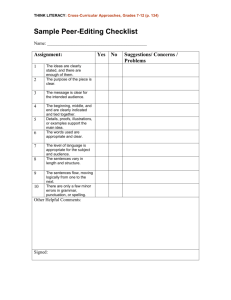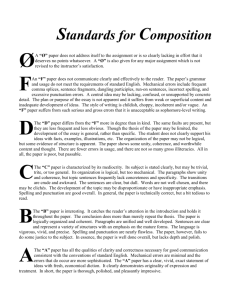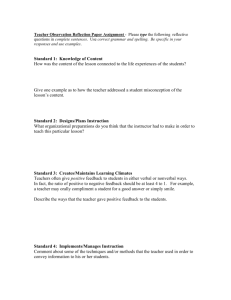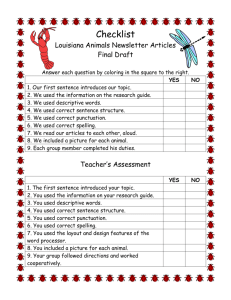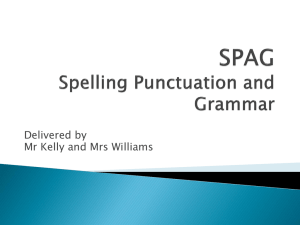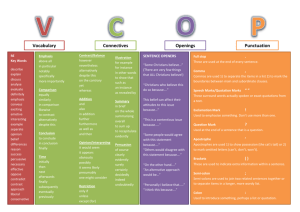Parents Presentation (K) UKS2
advertisement
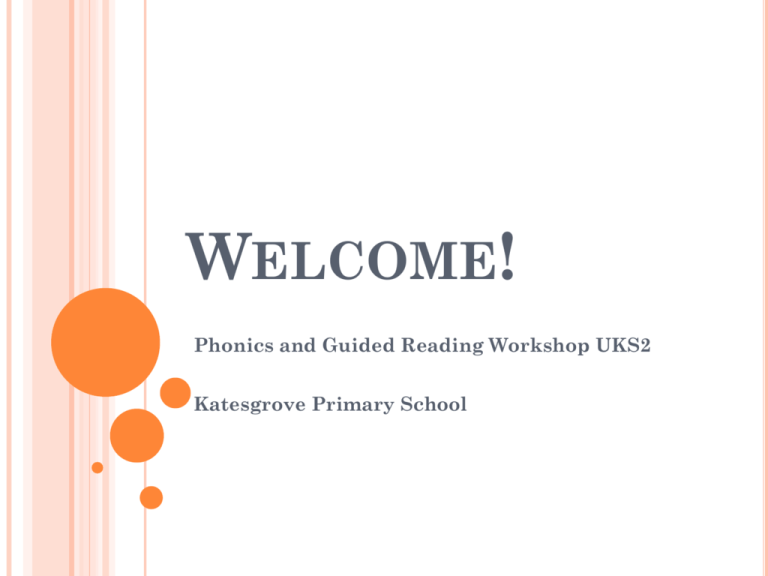
WELCOME! Phonics and Guided Reading Workshop UKS2 Katesgrove Primary School GUIDED READING Daily 20 minute sessions, small ability groups within the classroom. Assessment Focuses Reciprocal Reading Comprehension Assessment Focus 1 Use a range of strategies, including accurate decoding of text, to read for meaning. • Reading words on sight •Making use of phonic strategies •Using sentence and whole text knowledge •Showing awareness of the punctuation marks. Assessment Focus 2 I can find answers in the text. •Recalling main ideas •Retrieve relevant information •Connect words and illustrations •Identify how characters behave Assessment Focus 3 I can infer and deduce things from what is written in the text. •Use knowledge of the story so far to make predictions •Connect information together to draw out implied meanings •Distinguish between more or less important information •Use clues from what characters do and say to explore motives Assessment Focus 4 I can talk about the features of a text. •Make use of book conventions and organisational devices •Participate in group discussion to find information Assessment Focus 5 I can think and explain how the writer has used language to make it powerful. •Comment on the effect of specific words and how they convey meaning •Discuss language patterns and how they contribute to the meaning Assessment Focus 6 I can talk and comment on a writer’s viewpoint and how a text makes the reader feel. •Respond to the text and say what they liked and disliked about it •Identify the main purpose of a text Assessment Focus 7 I can compare and contrast different stories, authors and genres. •Relate texts to their social, cultural and historical contexts and literary traditions. •Identify traditional characters and settings •Relate the texts to authors COMPREHENSION Written questions and answers Whole class (Story time) or Guided Reading activity Part of morning lessons or Topic activities Variety of texts. SPAG (SPELLING PUNCTUATION AND GRAMMAR) What is SPaG? Year 6 test as part of SATs Sentence grammar through both identifying and writing sentences that are grammatically correct Punctuation through identifying and writing sentences that are correctly punctuated Vocabulary through identifying and writing sentences in which a word is used correctly Spelling (spelling rules eg. –ion, ie, -ful) HOW WILL WE HELP IN SCHOOL? Helps deepen understanding of how English language This helps improve writing Taught as part of writing unit Follow the New Curriculum – building blocks HOW CAN I HELP MY CHILD AT HOME? Copy some sentences from a book and get him to underline either the main or subordinate clause. Write down some unpunctuated sentences for your child to punctuate correctly. Call out a word and ask your child to tell you a synonym (a word that means the same) or an antonym (a word that means the opposite). When writing letters or emails, encourage your child to add an adjective or adverb to a sentence (e.g. ‘Thank you for my wonderful birthday present’) If your child asks you a question, ask how he would rephrase it as a command (e.g. ‘Can you make me a drink?’ becomes, ‘Make me a drink!’) Make spelling part of everyday life! Try a few unusual strategies to improve your child's spelling, put a fewteachers' spelling tricks to the test or play some great spelling games. Encourage your child to read a variety of texts – fiction, information books, comics, newspapers, magazines, etc – to broaden their vocabulary. http://www.theschoolrun.com/y6-spelling-punctuation-and-grammartest
